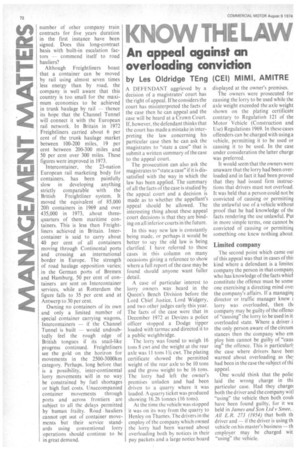An appeal against an overloading conviction
Page 74

If you've noticed an error in this article please click here to report it so we can fix it.
by Les Oldridge TEng (CEI) MIMI, AMITRE
A DEFENDANT aggrieved by a decision of a magistrates' court has the right of appeal. If he considers the court has misinterpreted the facts of the case then he can appeal and the case will be heard at a Crown Court. If, however, the defendant thinks that the court has made a mistake in interpreting the law concerning his particular case then he can ask the magistrates to "state a case" that is submit a written summary of the case to the appeal court.
The prosecution can also ask the magistrates to "state a case" if it is dissatisfied with the way in which the law has been applied. The summary of all the facts of the case is studied by the appeal court and a decision is made as to whether the appellant's appeal should be allowed. The interesting thing about these appeal court decisions is that they are binding on all inferior courts in the future.
In this way new law is donstantly being made, or perhaps it would be better to say the old law is being clarified: I have referred to these cases in this column on many occasions giving a reference to show where a full report of the case may be found should anyone want fuller detail.
A case of particular interest to lorry owners was heard in the Queen's Bench Division before the Lord Chief Justice, Lord Widgery, and two other judges early this year. The facts of the case were that in December 1972 at Devizes a police officer stopped a Dodge tipper loaded with tarmac and direeted it to a public weighbridge.
The lorry was found to weigh 16 tons 8 cwt and the weight at the rear axle was II tons 13/1 cwt. The plating certificate showed the permitted weight of the rear axle to be 10 tons and the gross weight to be 16 tons. The lorry had left the owner's premises unladen and had been driven to a quarry where it was loaded. A quarry ticket was produced showing 16.26 tonnes (16 tons).
At the time the vehicle was stopped 'it was on its way from the quarry to Henley on Thames. The drivers in the employ of the company which owned the lorry had been warned about overloading both by notices in their pay packets and a large notice board displayed at the owner's premises.
The owners were prosecuted for causing the lorry to be used while the axle weight exceeded the axle weight shown on the plating certificate contrary to Regulation 121 of the Motor Vehicle (Construction and Use) Regulations 1969. In these cases offenders can be charged with using a vehicle, permitting it to be used or causing it to be used. In the case under consideration the latter charge was preferred.
It would seem that the owners were unaware that the lorry had been overloaded and in fact it had been proved that they had issued firm instructions that drivers must not overload. It was held that a person could not be convicted of causing or permitting the unlawful use of a vehicle without proof that he had knowledge of the facts rendering the use unlawful. Put in more simple terms, one cannot be convicted of causing or permitting something one knew nothing about,
Limited company
The second point which came out of this appeal was that in cases of thi kind where a defendant is a limitec company the person in that compan3 who has knowledge of the facts whict constitute the offence must be some one exercising a directing mind mei the company's affairs. If a managirn director or traffic manager knew t lorry was overloaded, then thi company may be guilty of the offeno of "causing" the lorry to be used in it overloaded state. Where a driver,i the only person aware of the circum stances then the company who ern ploy him cannot be guilty of "caus ing" the offence. This is particularl: the case where drivers have beet warned about overloading as the: had been in the case the subject of thi appeal.
One would think that the polic laid the wrong charge in thi particular case. Had they charge( both the driver and the company wit! "using" the vehicle then both couli have been found guilty, for it wa held in James and Son Ltd v Smee„ All ER. 273 (1954) that both th driver and — if the driver is using th vehicle on his master's business — th employer may be charged wit "using" the vehicle.
































































































































